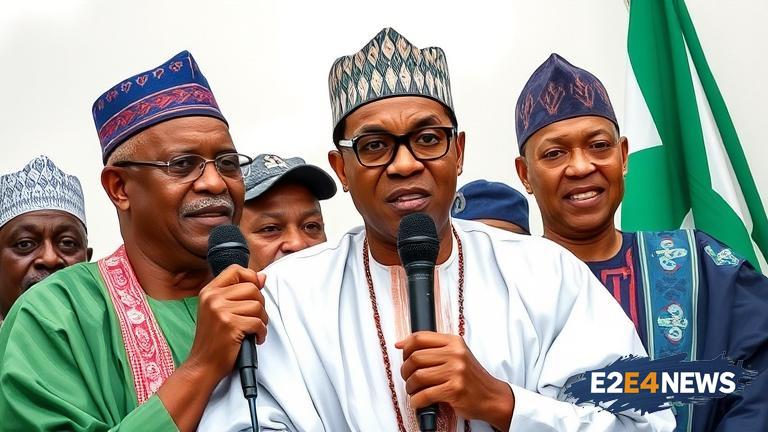The Peoples Democratic Party (PDP) is facing a deepening crisis as a member of the Board of Trustees (BoT), Onyia, has made a shocking claim that Governor Nyesom Wike of Rivers State is secretly working for the All Progressives Congress (APC). This allegation has sparked intense controversy and infighting within the party, with many questioning Wike’s loyalty and commitment to the PDP. Onyia’s statement has been met with widespread criticism and denial from Wike’s supporters, who argue that the governor has been a loyal and dedicated member of the party. However, Onyia’s claims have also been backed by some party members who feel that Wike’s actions and decisions have been inconsistent with the party’s values and principles. The PDP has been struggling to regain power since its defeat in the 2015 presidential election, and the current crisis has raised concerns about the party’s ability to unite and present a strong challenge to the APC in future elections. Wike, who has been a key figure in the PDP, has been accused of making decisions that benefit the APC, rather than the PDP. Onyia’s allegations have also highlighted the deep-seated divisions and power struggles within the party, which have been ongoing for several years. The PDP has been plagued by internal conflicts, factionalism, and leadership crises, which have weakened the party and made it vulnerable to external manipulation. The current crisis has also raised questions about the party’s leadership and its ability to make decisions that benefit the party as a whole. The PDP’s national chairman, Iyorchia Ayu, has been under pressure to address the crisis and find a solution to the party’s internal conflicts. However, Ayu’s efforts have been hindered by the party’s factionalism and the refusal of some party members to work together. The crisis has also sparked concerns about the party’s future and its ability to survive in the long term. The PDP’s struggles have been exacerbated by the APC’s dominance of Nigerian politics, which has made it difficult for the party to regain power. The APC has been in power since 2015 and has maintained a strong grip on the country’s politics. The PDP’s crisis has also been fueled by the party’s inability to present a united front and challenge the APC’s dominance. The party’s internal conflicts have made it difficult for the PDP to develop a coherent strategy and present a strong challenge to the APC. The current crisis has also highlighted the need for the PDP to reform and restructure itself in order to become a more effective and competitive party. The party needs to address its internal conflicts, develop a clear vision and strategy, and present a united front in order to challenge the APC’s dominance. The PDP’s crisis has also sparked concerns about the future of Nigerian democracy and the ability of opposition parties to challenge the ruling party. The APC’s dominance has raised concerns about the health of Nigerian democracy and the need for a strong and competitive opposition. The PDP’s crisis has also highlighted the need for the party to engage in introspection and self-reflection in order to identify its strengths and weaknesses and develop a plan to become a more effective and competitive party. The party needs to learn from its mistakes and develop a new strategy that takes into account the changing political landscape of Nigeria. The current crisis has also sparked concerns about the role of money and corruption in Nigerian politics and the need for the PDP to distance itself from corrupt practices. The party needs to develop a new culture that emphasizes transparency, accountability, and good governance. The PDP’s crisis has also highlighted the need for the party to develop a new leadership that is committed to the party’s values and principles. The party needs to identify new leaders who are capable of uniting the party and presenting a strong challenge to the APC. The current crisis has also sparked concerns about the future of Nigerian politics and the need for a new generation of leaders who are committed to good governance and transparency. The PDP’s crisis has also highlighted the need for the party to engage with civil society and other stakeholders in order to develop a new vision and strategy for the party. The party needs to listen to the concerns of Nigerians and develop a plan that addresses the country’s development challenges. The PDP’s crisis has also sparked concerns about the party’s ability to survive in the long term and the need for the party to develop a new strategy that takes into account the changing political landscape of Nigeria.
